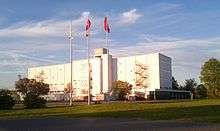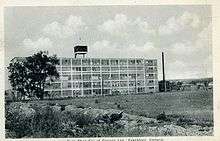Batawa
Batawa is a small community in southeastern Ontario, Canada, in the city of Quinte West. The community was set up by the Bata Shoe Company as a planned community around a shoe factory. The factory opened in 1939 and closed in 2000.

History

Conditions in Europe prior to World War II led Thomas J. Bata to search for a location in Canada to transfer operations. Batawa's location was chosen for its proximity to a lake, a railway, a highway, an airport and cheap land. A factory town was built and opened in 1939. The Bata company owned the town, providing accommodations at a reasonable rate to its workers. The company controlled virtually all aspects of the village. There was a Bata grocery store, Bata recreation hall, Bata clubs, Bata teams and a Bata shoe store. Many of the residents were immigrants from Bata's homeland, Czechoslovakia, who immigrated at the time of the factory's construction.[1] The town was initially the headquarters of Bata Shoe operations in Canada; the headquarters moved to Toronto in 1964.
During the latter half of the 20th century, tariff barriers on shoe imports into Canada were reduced, allowing more and more low-cost shoes into Canada. Eventually, Bata determined the factory could not continue as a viable business operation and closed the factory in March 2000. As part of a strategy to cut costs, Bata consolidated production in lower-wage countries overseas.[2] Bata Shoes would close its retail shoe stores in Canada one year later in 2001.
Dalton Company is converting the old Batawa shoe plant into a residential condo complex.[3]
Geography
Batawa is situated on the west bank of the Trent River, and nearby is Lock 4 of the Trent-Severn Waterway, a major water transportation system.[4]
Services
- Quinte West Fire Department Station 5
- Sacred Heart Catholic School
- Sacred Heart Roman Catholic Church
- Batawa Community Centre
Batawa is represented by three councillors on Quinte West City Council for the Ward of Sidney.
Further reading
There are several books about the Bata's including: Uprooted and Transplanted,[5] the story of a family that immigrated to Canada and worked at the Batawa facility.
See also
References
- Gray, John (May 23, 2000). "Way of life disappears with factory in Batawa". The Globe and Mail. p. A8.
- Strauss, Marina (January 17, 2000). "Bata to revamp worldwide operations". The Globe and Mail. p. B1.
- http://www.daltonbuild.com/dalton-company-batawa.php
- Angus, James T. A Respectable Ditch: A History of the Trent-Severn Waterway 1833-1920. McGill-Queens University Press, Montreal and Kingston, 1988.
- Skoutajan, Hanns F (2000). Uprooted and transplanted: a Sudeten odyssey from tragedy to freedom, 1938-1958. Owen Sound, ON: Ginger Press. ISBN 978-0-921773-54-2. OCLC 45265108.